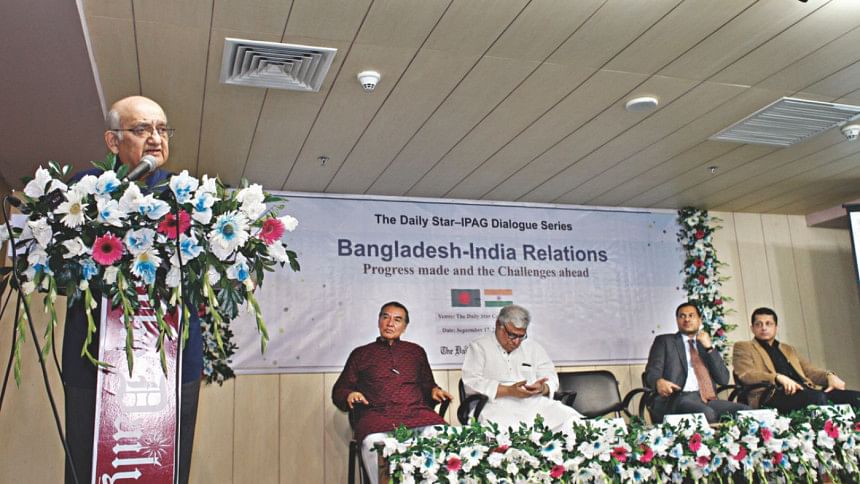India, Bangladesh must create value chains to boost trade

India and Bangladesh have failed to create value chains in the manner that China has done with its neighbours to spur regional economic development, eminent economist Rehman Sobhan said yesterday.
This has become one of the major constraints to stimulating exports from Bangladesh to India, which is the third largest economy in the world by purchasing power parity, according to Sobhan.
Prof Sobhan made the comments at a dialogue on Bangladesh-India relations, jointly organised by The Daily Star and the Institute for Policy, Advocacy, and Governance or IPAG at the newspaper's office in Dhaka.
International production and trade are increasingly organised within global value chains where different stages of production are located across different countries. Globalisation motivates firms to restructure their operations internationally through outsourcing and offshoring of activities.
Firms try to optimise their production by locating different activities across different sites.
The past decades have witnessed a strong trend towards the dispersion of value chain activities such as design, production, marketing and distribution.
Bangladesh accounted for only $650 million or 0.2 percent of India's total imports worth $390 billion last year though the country enjoys duty-free access to the India market, Sobhan said.
Even without any free trade agreement, countries such as Indonesia, Malaysia, Thailand and even Myanmar and Sri Lanka have higher exports to India than Bangladesh, he said.
Besides the limitations in entrepreneurship and export diversification, the economist said, Bangladesh has some structural constraints, such as the failure to create value chains that hurt the promotion of trade between the two countries.
On the contrary, China's trade with its neighbours is booming.
“In fact, China has become their (neighbours') biggest export market because of the value chains that have been created in the trade between China and its neighbours,” Sobhan said.
For example, he said, parts and accessories of electronic devices are manufactured in different countries and those are shipped to China for assembly. The products carry the 'made in China' label when they are sold across the world.
Bangladesh imported goods worth $13.6 billion from China in 2015 and the trade gap stood at nearly $13 billion, but nobody takes it into cognizance and nobody gets agitated like they do seeing $5 billion trade gap with India, he said.
According to the World Trade Organisation, global value chains are able to benefit from the respective comparative advantages of various countries. Firms slice their demand and supply chains into parts, varying the final products and their price according to consumers' tastes and socio-economic characteristics.
The electronics industry, one of the world's most important goods-producing sectors, is a very representative example of the importance of value chains. For example, different parts of a personal computer or a camera will be made in different countries before assembling the final product.

 For all latest news, follow The Daily Star's Google News channel.
For all latest news, follow The Daily Star's Google News channel. 






Comments